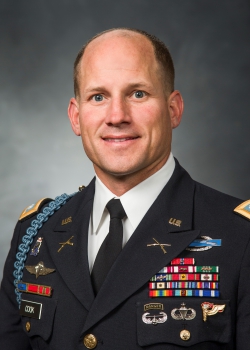To BYU or Not to BYU—That Was the Question
PROVO, Utah – Nov 02, 2018 – LTC Forrest “Chip” Cook, professor of military science in BYU Marriott’s Department of Military Science, is no stranger to BYU. As some would say, his blood runs blue.
“I was born and raised a BYU fan,” Cook says. “While growing up in Houston, I went to the stake center to watch BYU games on the satellite TV. I remember watching some of the storied moments at BYU.”
Although his parents were actually graduates of the University of Utah, they brought up their children as BYU fans. This decision eventually led seven of their eight children to attend BYU.
As for the one child who didn’t? Well, it was actually Cook.
After much consideration between BYU and the United States Military Academy (more commonly known as West Point), Cook ultimately chose to attend the latter upon graduation from high school. His decision was influenced by an encouraging church leader who had attended West Point as well as the possibilities the academy presented to serve people, get a good education, and play football.
“I was looking for a leg up,” Cook recalls. “And it certainly turned into a great opportunity career wise.”
Following his time at West Point, Cook had a number of invaluable experiences serving his country, including time alongside soldiers who enlisted in the Army after 9/11 and assignments in the US Department of Defense. But as Cook eventually discovered, time has a way of redirecting one’s course.
“I had been selected for command, which is the path to continue for promotion,” Cook says. “All of my mentors and the people I worked for expected me to do that; I had worked my whole career for that position. But this opportunity that opened up at BYU was the right thing for me and my family.”
Cook was brought on as a professor of military science—a position that consists of supervisory and administration roles for the Army ROTC program located on BYU campus. His main responsibilities are to teach, advise, and guide cadets as they prepare for service in the Army.
“I love being around the cadets,” Cook says. “The students are great young people who are ambitious in seeking opportunities to grow as leaders and to serve their country. That’s inspiring to me. Watching them progress in their own personal development is satisfying.”
Cook indicated that one of his favorite parts of the job is hearing from past cadets, many of whom express their gratitude for his influence and the opportunity to have participated in such a prestigious program.
“What I get back frequently from our graduates is that BYU—not just the university but also this ROTC program—has prepared them better than the majority of their peers,” Cook says. “It’s a credit to BYU and the great culture that’s here. It’s also a credit to the great folks I work with who help mentor and develop the cadets as they grow, become officers, and head out into the Army.”
That BYU culture doesn’t only speak to students, however. It certainly played a role in finally bringing Cook to the university that he grew up loving.
“BYU is the confluence of many important things to me,” Cook says. “It is awesome for me to be able to bring my professional experience here to serve in a role at a university that is such a unique place and provides so many incredible opportunities.”
Cook’s time at BYU has also allowed him to accomplish something he may not have anticipated upon graduation from West Point: be a BYU student.
“I just finished the executive MBA program here at BYU,” Cook says. “I’m finally a member of my family again.”
Media Contact: Chad Little (801) 422-1512
Writer: Brendan Gwynn




